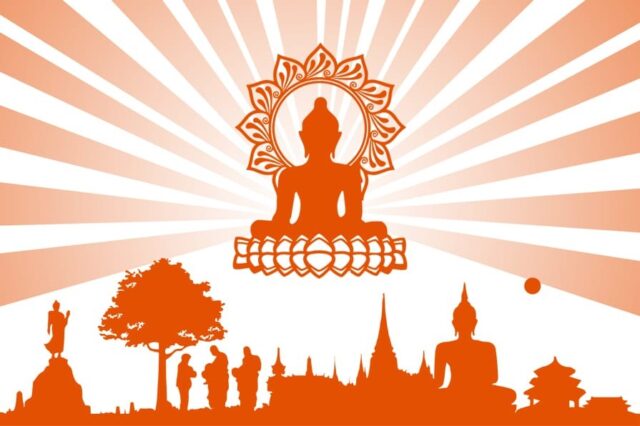India is hosting a one-of-a-kind, two-day “International Buddhist Summit”, from April 20th–21st, 2023. The Union Culture Ministry organized the summit in collaboration with the ‘International Buddhist Conference (IBC)’. The conference will commemorate Azadi Ka Amrit Mahotsav while also evaluating the contribution of Buddha Dharma, especially the role of Shakyamuni Buddha’s teaching in acting as a source of inspiration. Exploring the teachings of Buddhist scholars and Dharma Masters, the summit aims to enrich the Buddha dharma through the forum. The numerous areas for discussion at the conference will range from promoting initiatives for global welfare to the main theme of the conference “Response to Contemporary Challenges: Philosophy to Praxis”. This event involves participation from 30 countries, with 170 delegates from across the world. The delegates shall include prominent scholars, monks, diplomats, and members of Buddhist organizations across the globe. Broadly, four themes are identified for the conference: “Buddha Dharma and Peace, Buddha Dharma: Environmental Crisis, Health, and Sustainability, Preservation of Nalanda Buddhist Tradition and Buddhist Pilgrimage, and Living Heritage and Relics.” Some contemporary issues that are globally prevalent will be discussed under the purview of the conference from a Buddhist perspective.
Thematic View:
The conference shall examine the effect of Buddhist soft power influence across the world, which shall include various themes associated with the use of Buddhism. Some associated issues around climate change, poverty, conflict, etc. will be brought up. To bring peace to society, the Buddhist practices shall be further expanded through the Buddha Dharma Pilgrimage, building living heritage through the practice of ‘Buddha Relics: for a Resilient Foundation, and harnessing India’s centuries-old cultural links to countries in South, Southeast, and East Asia.
For advancing academic research in Buddhist studies, the conference would build a framework for adding value with the help of tools. These tools shall be useful for studying the viability of Buddhism and for conducting academic research on international research on a global stage to expand the soft power of Buddhist monks and scholars worldwide.
While Delhi is the center of the conference, Buddhist monks from around the world and India will participate in it. It will receive active participation from monasteries from across the regions, including the Union Territories of Ladakh and Jammu and Kashmir, Himachal Pradesh, Sikkim, Arunachal Pradesh, and northern West Bengal.
Buddhism as Soft Power:
As a soft power, Buddhism influences building bridges across the continent on economic, cultural, and educational dimensions. Earlier this year, during the SCO Shanghai Cooperation Summit, India held a similar conference on “Shared Buddhist History” India had received participants from across the globe, such as Central Asia, South Asia, and the Middle East, who discussed numerous issues such as food security, connectivity, and economic development. Further, building on this opportunity to expand its soft power influence over parts of Eurasia, India’s SCO (Shanghai Cooperation) presidency has an important role. Through the overlap of these conferences, India can use these platforms to address issues such as food security, connectivity issues, and other issues about economic development.
Since India shares historical affiliations that are linked to Buddhism, these affiliations help in establishing good faith and also create a strategic advantage. Buddhism in India can become a vital focal point in identifying the key areas of collaboration. Some previous initiates were led to promote spiritual tourism with the help of the Buddha Circuit, promote spatial activities among South Asian countries, etc. It would help India build its goodwill and would also act as a source of tourism and build partnerships among South Asian countries. Thus helping it strengthen its soft power diplomacy.
Future Goals and Prospects:
Sharing the vision for building the future through Buddhist diplomacy, during the inaugural speech, our Prime Minister elaborated on Buddha’s teaching and its importance in aligning it with the vision of Amrit Kaal. During his inaugural address, he expanded on India’s progress in its path to Paryakti, Patipatti, and Pativedha, i.e., theory, practise, and realisation. Through the imagined community of people connected with the same thread of teachings of Lord Buddha, India has made progress in resolving its issues and those of the whole world. In some of the recent projects, such as the Buddhist Circuit in India and Nepal, Kushinagar International Airport, or Lumbini, India is harnessing its soft power and its geographical proximity to Nepal to gain a strategic advantage. With its rich Buddhist heritage, India hopes to build strategic, diplomatic, economic, cultural, and strategic alliances. India hopes to achieve this through Mission LiFE, which it announced at the G20 presidency. Combining its G20 presidency with the Buddhist Conference, India promotes individual and collective action on protecting and conserving the environment. Therefore, following on the similar tenants set at the G20, during the Buddist Conference, India enunciates and puts across the importance of building cross-cultural links, creating a feeling of fraternity, and encouraging the practice of following the middle path.









